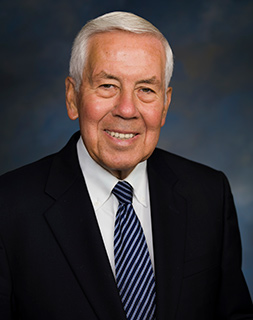By Richard G. Lugar
 When the Soviet Union collapsed at the end of the Cold War, leaving the vast Soviet arsenal of nuclear, chemical and biological weapons exposed to possible theft and diversion, my colleague Sen. Sam Nunn and I proposed doing something unprecedented. We said that, for the sake of America’s own security and safety, our taxpayers should spend hundreds of millions of dollars each year securing and dismantling the deadly weapons and delivery systems of our former adversary, which only a few months earlier had been aimed directly at us.
When the Soviet Union collapsed at the end of the Cold War, leaving the vast Soviet arsenal of nuclear, chemical and biological weapons exposed to possible theft and diversion, my colleague Sen. Sam Nunn and I proposed doing something unprecedented. We said that, for the sake of America’s own security and safety, our taxpayers should spend hundreds of millions of dollars each year securing and dismantling the deadly weapons and delivery systems of our former adversary, which only a few months earlier had been aimed directly at us.
Needless to say, many of our Congressional colleagues and members of the George H.W. Bush administration were highly skeptical. Hoping to cash in a “peace dividend,” they said it was too expensive and wouldn’t work. When we ultimately prevailed, creating the Nunn-Lugar Cooperative Threat Reduction program, Bechtel was one of our key early partners. The strong performance by these original contractors on those first projects, demonstrating that the task could be accomplished, was critical to the program’s survival and ultimate success.
Bechtel was crucial in another way in those early years. Its officials and experts served as informal ambassadors for Nunn-Lugar on Capitol Hill, explaining to still-doubting legislators how the work they were doing was reducing threats. Through meetings with individual members and staff, they effectively made the case that the program was strongly in America’s national security interest, and that the money was being spent efficiently to make Americans safer.
This also illustrates of one of the untold stories of Nunn-Lugar. The program was our country’s key line of defense against weapons and materials of mass destruction, yet the private sector did nearly all the complex work of dismantling more than 7,600 nuclear warheads, disposing of many tons of chemical and biological weapons, and taking apart thousands of missiles, bombers, and submarines. A handful of elite American companies conducted the personal day-to-day engagement with the Russians, Ukrainians, Kazakhs and others. They hired and trained many local employees. They were, in effect, on the diplomatic front lines, helping ensure the projects could overcome the inevitable bureaucratic and political obstacles that arose.
We will never know, of course, what disasters may have been avoided by the work of the Nunn-Lugar program. But the risk was undoubtedly great, and Bechtel should be rightly proud of its role in that endeavor.
Retired Sen. Richard G. Lugar (R, Ind.) served in the Senate for 36 years, and was chairman and ranking member of the Senate Foreign Relations Committee. In 2013, President Obama awarded him the Presidential Medal of Freedom for “his visionary work, the destruction of Cold War arsenals in the former Soviet Union.” He is currently president of The Lugar Center, a Washington, D.C., non-profit public policy organization.

